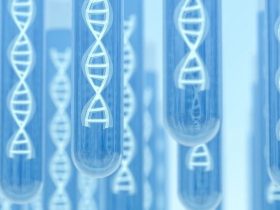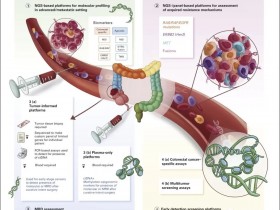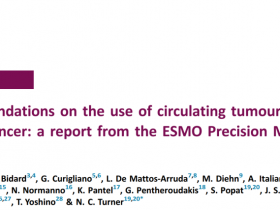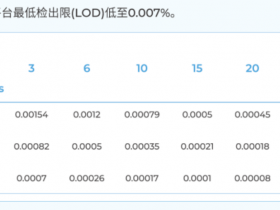- A+
关键词:
- 三阴性乳腺肿瘤(triple negative breast cancer,TNBC),IHC分类
- 家族性乳腺肿瘤 early-onset and familial breast cancer,医生判定
- basal-like 乳腺肿瘤,可以由PAM50分类
- BRCA1/2基因的germline病理性突变,测序加上数据库注释
- isolated late-onset breast cancer, 主要是TCGA等数据集
家族性乳腺肿瘤和 BRCA1/2基因的germline病理性突变
家族性乳腺肿瘤患者主要是由医师来辨别!!!
BRCA1/2基因的germline病理性突变通常是一代测序即可,目前也慢慢转移到NGS啦。
家族性乳腺肿瘤患者占乳腺肿瘤群体只有20%左右,而这个群体里面只有 ~20% 左右是有着 BRCA1/2基因的germline病理性突变,当然人种地域的比例区别蛮大的,所以 大家喜欢强调中国人群的比例作为研究的新颖独创性。
人类两万多个基因,而 BRCA1/2这2个基因就能占比近20%已经是非常恐怖的了,所以市面上的检测产品都喜欢说检测 BRCA1/2基因来筛查乳腺肿瘤,但事实上其它基因引起的乳腺肿瘤患者更多,只不过其它基因更多,检测起来更麻烦成本更高。
家族性乳腺肿瘤患者群体里面另外的8成并没有被探究清楚,有各种各样的GWAS研究来搜索乳腺肿瘤易感基因,但并没有刻意针对家族性乳腺肿瘤患者群体。
即使有BRCA1/2基因的germline病理性突变,也不一定会发生乳腺肿瘤,但是终身患肿瘤概率会随着年龄增加,50%~80%,也算是很高了,正常人即使到80岁也才10%
这些数据都是有文献支持的!!!
家族性乳腺肿瘤和 三阴性乳腺肿瘤
乳腺肿瘤是一类高度异质性疾病,其中雌激素受体(estrogen receptor,ER)、孕激素受体(progesterone receptor,PR)和人类表皮生长因子受体2(human epidermal growth factorreceptor 2,HER-2)均阴性的三阴性乳腺肿瘤(triple negative breast cancer,TNBC)约占10%~15%。
TNBC占乳腺肿瘤群体的比例和家族性乳腺肿瘤相当,但它们并不等价!
根据基因表达谱把TNBC分成6类
为更好地定义TNBC特异性分子特征,Lehmann等根据基因表达谱分析将其细分为6个亚型,分别为基底样型1和2(BL1和BL2)、间叶细胞型(M)、间充质干细胞型(MSL)、雄激素受体型(LAR)和免疫调节型(MI)。
basal-like 和TNCB也不等价
有比较分析的文章: Comparison of basal-like triple-negative breast cancer Mod Pathol. 2013 Jul;
有书籍大篇幅描写: http://jbcr.mu-pleven.bg/pdf/vol3no1/7.pdf
BRCA1/2基因的germline病理性突变 和 三阴性乳腺肿瘤
not all “triple negative” breast cancer patients have a germline BRCA1/2 mutation.
突变本身就是很复杂的概念
在肿瘤领域的somatic突变主要是区分recurrent和inactivating的突变
其中recurrent突变包括
- nonsynonymous SNVs
- in-frame indels
- oncogene score (ONC)
而inactivating突变包括:
- frameshift indels
- nonsense SNVs
- splice site mutations
- tumour suppressor gene score (TSG)
乳房 相关疾病
浸润性导管肿瘤(IDC)是最常见的乳腺肿瘤。它从乳管破裂,进入周围组织。
其他常见类型的乳腺肿瘤包括:
- 导管原位肿瘤(DCIS):开始并停留在乳管内。
- 原位小叶肿瘤(LCIS):开始并停留在产乳腺体内。
- 侵袭性小叶肿瘤(ILC):超越腺体。
- IDC亚型:包括管状,髓质,粘液性,乳头状和胞质型。
较不常见的形式包括:
- 炎症性乳腺肿瘤:只有1-3%的病例。
- 佩吉特乳头病:1%的病例。
- 乳腺叶状肿瘤的生长快,往往不是肿瘤。
germline和somatic突变
定位病理性的germline的突变可以参考:https://link.springer.com/article/10.1007/s00432-018-2609-5
定位somatic的突变参考:https://www.ncbi.nlm.nih.gov/pmc/articles/PMC2712719/
GWAS研究乳腺肿瘤易感基因参考:https://www.ncbi.nlm.nih.gov/pubmed/27354352
各种各样的乳腺肿瘤的somatic突变探究
主要是以broad和sanger研究所为主,加上METABRIC和MSK两个联盟。
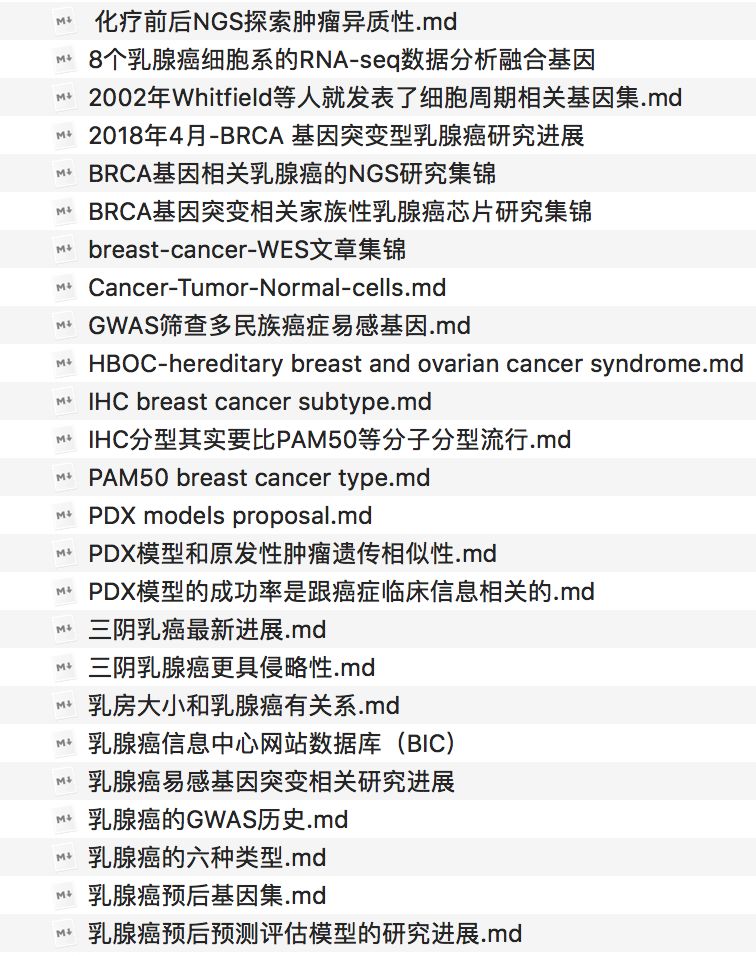
乳腺肿瘤的13个易感基因
参考文献是:Ann Oncol. 2015 , 总结了那些乳腺肿瘤相关的胚系遗传性的致病突变,结论很简单:
- Up to 25% of hereditary cases are due to a mutation in one of the few identified rare, but highly penetrant genes (BRCA1, BRCA2, PTEN, TP53, CDH1, and STK11), which confer up to an 80% lifetime risk of breast cancer.
- An additional 2%-3% of cases are due to a mutation in a rare, moderate-penetrance gene (e.g. CHEK2, BRIP1, ATM, and PALB2), each associated with a twofold increase in risk.
- 最后是低风险的多态性位点,A small number of low-penetrance alleles have been identified using advanced genetic testing methods.
家族性乳腺肿瘤是没有确切定义的,可以是满足下面5个条件:
- (i) at least three breast and/or ovarian cancer cases in a family;
- (ii) two breast cancer cases in close relatives, with at least case diagnosed before age 50;
- (iii) two breast cancer cases in a family diagnosed before 40 years of age;
- (iv) any male breast cancer with a family history of ovarian cancer or early onset female breast cancer; (v) Ashkenazi Jewish ancestry with breast cancer, particularly triple-negative breast cancer diagnosed before age 60;
- (vi) breast and ovarian cancer in the same patient.
However, these criteria largely encompass only the phenotype of the Hereditary Breast/Ovarian Syndrome (HBOC; discussed in more detail below) and a predisposing gene is identified in <30% of cases with suggestive feature
还总结了一些目前市场现有的基因检测芯片,都是纳入所有的高风险基因,部分中等风险基因以及少量多态性相关基因。
乳腺肿瘤生信知识集锦
乳腺肿瘤预后基因集
了解5个乳腺肿瘤表达数据集
TCGA数据库里面的乳腺肿瘤样本RNA-seq数据是配对的有哪些?
漫说乳腺肿瘤
三阴乳腺肿瘤更具侵略性
乳腺肿瘤研究的PAM50介绍
乳腺肿瘤分子分型
猜你喜欢
